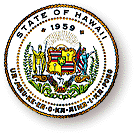Sale of Verizon wins
key endorsement
Carlyle's concessions help sway
the state consumer advocate
|
The state Division of Consumer Advocacy has thrown its support behind the proposed sale of Verizon Hawaii to the Carlyle Group, but only if the new owner promises to shield consumers from any impact for several years.
 In a position statement filed yesterday with the state Public Utilities Commission, Consumer Advocate John Cole said the Carlyle Group had agreed to several conditions in exchange for his blessing, including a moratorium on rate increases until 2009 and a one-time customer credit amounting to around about one month's basic phone charges.
In a position statement filed yesterday with the state Public Utilities Commission, Consumer Advocate John Cole said the Carlyle Group had agreed to several conditions in exchange for his blessing, including a moratorium on rate increases until 2009 and a one-time customer credit amounting to around about one month's basic phone charges.
"We had some serious reservations about the plan that Carlyle initially presented, but after a series of discussions, we were able to agree on conditions that will address the concerns," Cole said.
Cole's position on the proposed $1.65 billion acquisition of the state's dominant phone company was the last -- and possibly most weighty -- submission to the commission, which has been collecting input on the sale in advance of a ruling.
The Carlyle Group has proposed buying Verizon's Hawaii operations and renaming them Hawaiian Telcom, and has promised to invest "tens of millions" of dollars in a locally based carrier that will be more responsive to Hawaii than far-flung Verizon Communications.
In his filing, however, Cole said that any promised benefits by the Washington-based private equity firm are far outweighed by the risk.
Chief among these is the high ratio of debt being used by Carlyle to finance the sale, the possibility difficulty in obtaining needed future capital that could result, and the company's inexperience in operating a telephone company.
"Instead of benefits for consumers, the proposed transaction raises the prospect of increased operating expenses, increased operational risks, reduced financial flexibility and diminished access to capital markets," the filing said.
Carlyle is proposing to finance 82.5 percent of the sale. That raises the specter of the deal's creditors eventually seeking more control, to the detriment of ratepayers, Cole said.
Cole said the PUC should approve the sale, but under certain conditions, including:
» If a rate increase is approved, Carlyle must make an additional equity investment in the company equal to the amount of the annual increase.
» Seller Verizon Hawaii will provide $12 million for a "customer appreciation bill credit" to ratepayers equal to roughly one month's basic phone charges, in order to provide some tangible benefit to consumers.
» Carlyle must agree to a number of requirements on access to information and reporting of financial data to the PUC.
Mike Ruley, who has been named chief executive of Hawaiian Telcom, said Carlyle would respect those provisions.
"Although we do not agree fully with the consumer advocate's analysis, we commend the Division of Consumer Advocacy for its thoroughness, professionalism and commitment to Hawaii's consumers," he said.
The division's qualified blessing joins those filed late last month with the PUC by the Department of Defense and the International Brotherhood of Electrical Workers, the phone company's union. Local phone and Internet provider Pacific Lightnet, which would be both a competitor and a customer through the leasing of Hawaiian Telcom lines, urged the PUC to demand more information from Carlyle on its business plan.
The IBEW supported the sale but raised concerns about Carlyle's plans to retain the bulk of Verizon Hawaii's pension fund.
The IBEW estimated the total size of the fund at between $666 million and $750 million at the end of 2002. However, only $273 million is to be transferred to Hawaiian Telcom under the merger proposal.
The IBEW said that though the pension plan was "vastly overfunded" to meet the needs of the 1,400 employees who would be transferred to Hawaiian Telcom, surpluses have been used in the past for enhanced and early retirement for some employees.
"By Hawaiian Telecom not receiving the surplus, a potential funding source for further retirement options is lost," the union said, asking the PUC to require that the entire fund be transferred.
Cole said the merger would leave Hawaii's dominant local phone carrier in a much more shaky position than it was under Verizon, with its national reach and associated financial muscle, but that his division's stipulations should provide an appropriate hedge.
"These provisions should limit the exposure of Hawaiian Telcom ratepayers during the critical early years when debt-service obligations and transition cost burdens are most severe," his filing said.
In hearings on the merger, much of the public testimony centered on the Carlyle Group's perceived reputation for focusing on high returns for investors, something that might not coincide with the interests of consumers.
But Cole said he was not concerned that Carlyle might eventually sell the company.
"We know they're an investment group, and that's ultimately their plan at some point, whether through an outright sale or an IPO. The fact that they might turn it around and sell it is not necessarily a detriment to consumers," he said.
The PUC has no set timetable to issue a ruling. The Carlyle Group, however, is requesting a resolution by late February, a PUC attorney said.
www.state.hi.us/dcca/dca/
Public Utilities Commission
www.hawaii.gov/budget/puc/
[News] [Business] [Features] [Sports] [Editorial] [Do It Electric!]
[Classified Ads] [Search] [Subscribe] [Info] [Letter to Editor]
[Feedback]
